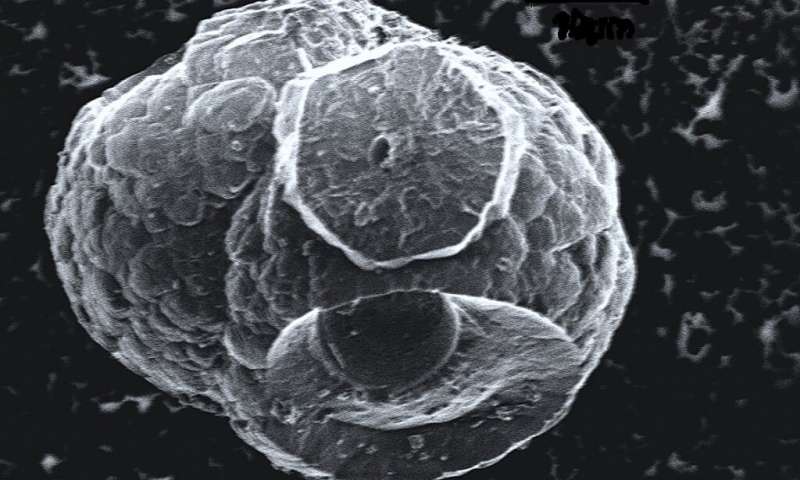Could 'flammable ice' be the key to discovering alien life?

Breaking space news, the latest updates on rocket launches, skywatching events and more!
You are now subscribed
Your newsletter sign-up was successful
Want to add more newsletters?

Delivered daily
Daily Newsletter
Breaking space news, the latest updates on rocket launches, skywatching events and more!

Once a month
Watch This Space
Sign up to our monthly entertainment newsletter to keep up with all our coverage of the latest sci-fi and space movies, tv shows, games and books.

Once a week
Night Sky This Week
Discover this week's must-see night sky events, moon phases, and stunning astrophotos. Sign up for our skywatching newsletter and explore the universe with us!

Twice a month
Strange New Words
Space.com's Sci-Fi Reader's Club. Read a sci-fi short story every month and join a virtual community of fellow science fiction fans!
In studying what's known as "flammable ice," researchers have discovered that microscopic bubbles within the strange material contain life. These findings could inform the quest to identify extraterrestrial life.
Flammable ice, also known as methane hydrate, is created when methane gas is trapped within ice's molecular structure. Sheets of this frozen gas and ice contain microscopic bubbles of oil and water. In a new study, scientists studying "flammable ice" in the Sea of Japan found microscopic, living creatures within these tiny bubbles.
The researchers in this study came upon this discovery in a unique manner. While melting hydrate to study the methane gas it contains, Glen T. Snyder, a researcher at Meiji University and lead author of the new study, noticed a powder with little, microscopic spheroids in it that contained tiny spheres with dark centers in them. The finding was so strange that Snyder gathered a team together to probe further.
Related: 13 Ways to Hunt Intelligent Aliens
"In combination with the other evidence collected by my colleagues, my results showed that even under near-freezing temperatures, at extremely high pressures, with only heavy oil and saltwater for food-sources, life was flourishing and leaving its mark" inside these little bubbles in the "flammable ice," Stephen Bowden of the University of Aberdeen's School of Geosciences in Scotland, a co-author on this study, said in a statement.
To come to this conclusion, Bowden used analytic techniques developed at the University of Aberdeen that are specially designed for small sample sizes. Using these techniques, Bowden was able to show that the oil in this unique material was degrading in the tiny environments of the bubbles within the flammable ice.
So how does this work inform the search for extraterrestrial life? "The methane in 'methane hydrate' is known to form as microbes degrade organic matter on the seafloor. But what we never expected to find was microbes continuing to grow and produce these spheroids, all of the time while isolated in tiny cold dark pockets of saltwater and oil," Snyder said in the statement. "It certainly gives a positive spin to cold dark places, and opens up a tantalizing clue as to the existence of life on other planets."
Breaking space news, the latest updates on rocket launches, skywatching events and more!
"It certainly changes how I think about things," Bowden added, as he thought about what this discovery could mean for the search for life on cold exoplanets. "Providing they have ice and a little heat, all those frigid cold planets at the edge of every planetary system could host tiny microhabitats with microbes building their own 'death stars' and making their own tiny little atmospheres and ecosystems, just as we discovered here."
These findings were detailed in a paper published Feb. 5 in the journal Scientific Reports.
- 10 Exoplanets That Could Host Alien Life
- Where Does the Concept of Time Travel Come From?
- 13 Ways to Hunt Intelligent Aliens
Follow Chelsea Gohd on Twitter @chelsea_gohd. Follow us on Twitter @Spacedotcom and on Facebook.


Chelsea “Foxanne” Gohd joined Space.com in 2018 and is now a Senior Writer, writing about everything from climate change to planetary science and human spaceflight in both articles and on-camera in videos. With a degree in Public Health and biological sciences, Chelsea has written and worked for institutions including the American Museum of Natural History, Scientific American, Discover Magazine Blog, Astronomy Magazine and Live Science. When not writing, editing or filming something space-y, Chelsea "Foxanne" Gohd is writing music and performing as Foxanne, even launching a song to space in 2021 with Inspiration4. You can follow her on Twitter @chelsea_gohd and @foxannemusic.
